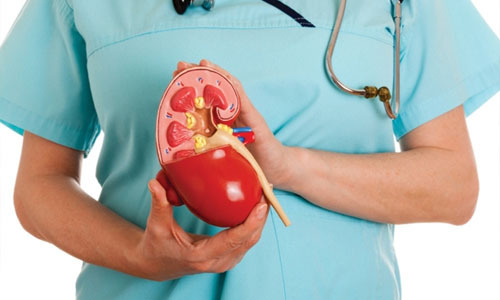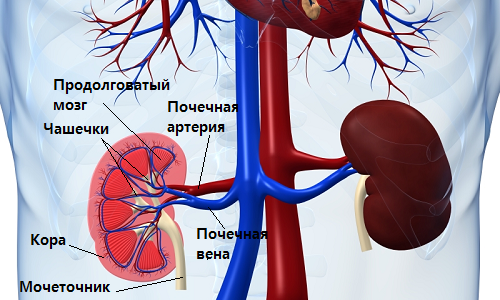The violation of excretory renal function, coupled with nitrogenous slagging of the blood, is called renal failure. A similar disease can develop in several forms: chronic and acute. If irreversible violations of renal function are observed in the patient for 3 or more months, then chronic renal failure is diagnosed. The development of pathology is promoted by chronic renal pathology, which causes the progressive death of nephrons. For pathology is characterized by a violation of renal excretory function and the development of uremia, accumulation and intoxication with exchange products of nitrogen such as uric acid and creatinine or urea.

The development of the disease is preceded by acid-alkaline and water-salt disorders, hypertension. Chronic insufficiency is the final stage of the long-term pathological process of mass destruction of nephrons and the gradual reduction of the kidneys( the result is a wrinkled organ with disturbed functions).
What happens in the pathology of
Renal failure is inherently a change in the structures of the renal parenchyma of an irreversible nature leading to a reduction in viable nephrons, their destruction and wrinkling. A distinctive feature of this pathological process is the lack of the possibility of restoring the renal tissue, and the ability of the kidneys to compensate for such pathology is greatly depleted. Chronic uremia can develop in a very short time( even for six months).Gradually, the functions of concentration or dilution of urine are lost, the functions of homeostasis, blood cleansing and discharge are disturbed. The blood raises the content of nitrogen-exchange products like uric acid, ammonia, amino acids, urea, with the output of which the kidneys can not cope. Also, the amount of extracellular fluid increases, and the content of plasma potassium increases.
With the development of renal failure, neurological disorders are often observed: sleep disturbances, inhibition, absent-mindedness, confusion, less often hallucinations and delusions.
Chronic renal failure affects many organs and body systems. In the blood system, there are changes associated with anemia, caused by a shortened erythrocyte vital activity and oppressed hematopoiesis. There are irregularities in the blood coagulation system. Changes affect the heart and lungs - the patients develop hypertension, heart failure, myocarditis and pericarditis, and in advanced stages and pneumonitis uremic nature.
Causes of deficiency
This pathological condition, like kidney failure, is often a consequence of glomerulonephritis or pyelonephritis of chronic form, hereditary or systemic nephritis, renal polycystosis or amyloidosis, glomerulosclerosis of a diabetic nature, nephroangiosclerosis and other kidney pathologies. Disorders such as diabetes, systemic connective pathologies, malaria and gout, hepatitis and vasculitis, urolithiasis and toxic effects can provoke the development of renal insufficiency.
The basis of this pathogenetic condition is the destruction of nephrons of a progressive nature. First, the function of renal processes begins to decrease, gradually turning into renal dysfunction. Before the failure develops, the patient usually experiences a prolonged period of chronic kidney pathology( within 3-10 years).

Classification of pathology
Chronic renal failure proceeds in several stages:
Latent
This stage is characterized by the absence of any prominent signs. To reveal a pathology in this case it is practically impossible, for this it is necessary to conduct in-depth clinical and diagnostic studies. Patients occasionally experience proteinuria.
Compensated
At this stage, patients are concerned about dry mouth and fatigue. The density of urine decreases, and its volume increases. The level of urea and creatinine rises.
Intermittent
Symptoms become more pronounced, there are various complications caused by increasing chronic renal failure. The patient's condition changes periodically, he is concerned about the increased content of creatinine and acidosis( increased acid balance).
Terminal
Diuresis( more than a liter) is characteristic for this stage. Then the amount of urine is reduced to 0.5 liters, there are signs that the fluid is retained in the body. Gradually the clinic grows, and the severity of symptoms becomes bright. Develops heart failure, the phenomenon of stagnation in the lungs and liver. The final stage of the terminal stage is intoxication with uremia, dystrophy of the liver and heart failure of a progressive nature.
Symptoms of the disease
The onset of the disease usually does not have a pronounced symptomatology, so the pathology can only be detected with a clinical diagnostic study. When a patient dies more than 80% of nephrons, then the first symptomatic characteristic of the disease appears. The first clinical manifestations often become fatigue and weakness. There is frequent urination at night, polyuria with a risk of dehydration. Gradually the disease progresses, weakness becomes stronger, there are involuntary contractions of the muscles, itching of the skin, nausea and vomiting syndrome.
 Often chronic renal failure is accompanied by bitterness and dryness in the oral cavity, loose stools, loss of appetite, painful heaviness in the pit of stomach. Patients suffer from heart pain, shortness of breath and high blood pressure. Because of violations of blood loss in patients often develop gastrointestinal and nasal bleeding, hemorrhages on the skin. In advanced stages, patients note the appearance of pulmonary edema or attacks of cardiac asthma, as well as a disorder of consciousness. Patients with kidney failure are characterized by soreness, a tendency to cold and other infections, which further worsen the course of the underlying disease.
Often chronic renal failure is accompanied by bitterness and dryness in the oral cavity, loose stools, loss of appetite, painful heaviness in the pit of stomach. Patients suffer from heart pain, shortness of breath and high blood pressure. Because of violations of blood loss in patients often develop gastrointestinal and nasal bleeding, hemorrhages on the skin. In advanced stages, patients note the appearance of pulmonary edema or attacks of cardiac asthma, as well as a disorder of consciousness. Patients with kidney failure are characterized by soreness, a tendency to cold and other infections, which further worsen the course of the underlying disease.
In general, the symptomatology of kidney failure is manifested by drowsiness, apathy, sluggishness of patients. They often suffer from skin itching and acidotic breathing. Even in a state of extreme anxiety, perspiration in patients is absent, although the face distinguishes symptoms of puffiness. In most cases, the pathology is accompanied by hypokalemia, which provokes muscle weakness. Calcium deficiency in this pathology is manifested by convulsions and twitching of muscle tissue. Such patients often have abnormalities of gait and motor functions, soreness in bone tissues. This symptomatology is explained by the slow growth of renal dysfunction.
A common symptom of the disease is osteoporosis( skeletal changes) that occurs against the background of demineralization. Joints start to accumulate in the joints, causing morbidity in motor activity, inflammation of the joint tissues and their swelling.
Many patients experience soreness in the thorax, which is often associated with fibrous pleurisy of uremic etiology. When listening to manifest pulmonary rattles, indicating the development of complications associated with cardiopulmonary insufficiency. A frequent sign of renal dysfunction is secondary pneumonia. Chronic uraemia, characteristic of renal dysfunction, manifests itself in the development of pericarditis in patients. A common symptom of pathology is pneumonia or pulmonary edema uremic. For patients with a similar pathology, the development of hypertensive cardiovascular symptoms is often characterized.
Chronic renal failure is often characterized by anorexia, manifested by a nausea-vomiting syndrome, a disgusting unpleasant aftertaste and dryness in the oral cavity, an aversion to food, after which the patient feels thirst and epileptic severity. Against the background of pathology, anemia develops, accompanied by toxic leukocytosis.
Treatment of kidney failure
Treatment of failure is due to the stage of the disease. Patients are shown adherence to the diet, which provides a full meal, containing up to 3000 kcal. Along with such nutrition is shown the intake of anabolic drugs like Retabolil, Methandrostenolone, etc. To purify blood plasma from nitrogenous slagging, it is recommended that the patients enlarge the drinking regime. With pronounced hypertension, hypotensive drugs are prescribed. Increased puffiness is eliminated by saluretics such as Uregit, Furosemide or thiazide agents.
The most important value in the treatment of kidney failure is a specialized diet, which is individually made by the treating specialist.
If pathology is complicated by infection, the treatment is supplemented with the use of antibiotic drugs, in addition to antibiotics with nephrotic effect. The use of glucose-rich drinks or intravenous administration of it can significantly improve the patient's condition, reduce creatinine and urea. Since chronic intoxication contributes to the development of anemia, patients are shown taking cobalt and iron preparations in combination with folic acid and vitamin B. To this end, drugs such as Ferkoven, Ferrocerone, Jektofer or Ferbitol are prescribed. If the hemoglobin content drops sharply, red blood cell transfusion is performed. Pathological excretion of calcium salts requires the intake of chloride or calcium gluconate.
Basic therapy for kidney failure is supplemented by complex vitamin therapy. Running forms of pathology require the use of substitution therapy such as peritoneal or hemodialysis. The latter is a krovoochischenie with the elimination of toxic substances, the normalization of the electrolyte and water balance. Peritoneal dialysis involves the installation in the cavity of the peritoneum of a special catheter, providing delivery of a dialysate, leaching excess water and harmful compounds from the blood.



